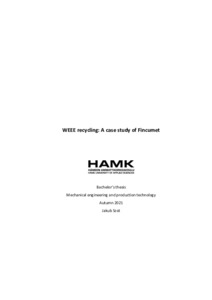WEEE recycling, a case study of Fincumet
Szot, Jakub (2021)
Szot, Jakub
2021
Julkaisun pysyvä osoite on
https://urn.fi/URN:NBN:fi:amk-202201081113
https://urn.fi/URN:NBN:fi:amk-202201081113
Tiivistelmä
Waste from electrical and electronic equipment or WEEE, is a broad category of waste involving electronics and e-scrap. Recycling WEEE can be made valuable by breaking down and reusing the waste, or processing it for individual material fractions. The field of WEEE recycling is fairly new and many innovative processes are being developed to deal with the waste. There are a lot of benefits in recycling WEEE especially when it comes to rare metals, it is also important to reuse and recycle waste for the purpose of the circular economy. Circulating materials and electronics to be reused will allow for the efficient use of resources, and hopefully limit the reliance on extractive processes.
This thesis provides a case study on how feasible industrial solutions for WEEE recycling might be developed. For this purpose a case study was used in the form of an industrial solution for a Finnish company which is trying to break into the field, this case study takes the form of an investigation. The background and theory on WEEE is discussed here, in conjunction with the case study to determine a conclusion. A detailed industrial operation is described within the thesis, acting as the primary concept for proving the feasibility of WEEE recycling. The thesis concludes by analysing the soundness of the proposed WEEE operation, providing a case study for developing such solutions. The thesis has was comissioned by Fortum.
This thesis provides a case study on how feasible industrial solutions for WEEE recycling might be developed. For this purpose a case study was used in the form of an industrial solution for a Finnish company which is trying to break into the field, this case study takes the form of an investigation. The background and theory on WEEE is discussed here, in conjunction with the case study to determine a conclusion. A detailed industrial operation is described within the thesis, acting as the primary concept for proving the feasibility of WEEE recycling. The thesis concludes by analysing the soundness of the proposed WEEE operation, providing a case study for developing such solutions. The thesis has was comissioned by Fortum.
